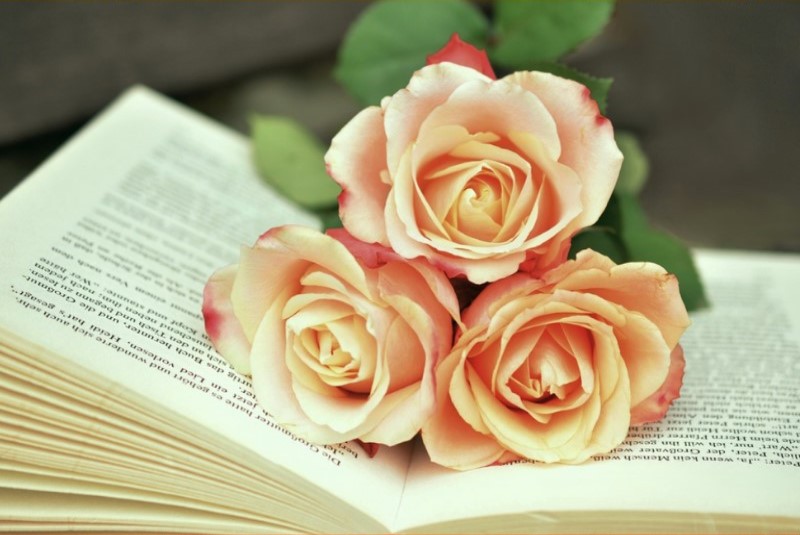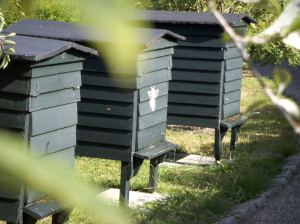Whilst surfing Twitter recently, I was reminded about the world plight of the humble honey bee, a creature ignored by me for some decades. Why? I spent them recovering from the scars of my teenage years.
Let me explain. I was around five or six years old when my father brought home his first swarm of bees. Weird, I thought. Like you do when you’re that age. I didn’t realise I was expected to partake in looking after them.
We dutifully dressed in long sleeves and trousers, my brother and I wearing the bee hats mother had recently sewn for us. We stood at a ‘safe’ distance on a drowsy summer’s evening in the orchard and watched as father presented the bees with their new home, and we waited for their approval. Over the next few years, it became apparent that my mother and brother were allergic to the stings and father and I weren’t.
Unlucky me!
I remember tagging along on trips to a workshop where the smell of warm beeswax scented the air, while father made sheets and sheets of hexagonal rectangles. I was bored stiff fascinated. During winter evenings he spent hours making wooden frames for the sheets to hang in.
Honey extracting was mother’s job. On hot summer days, we had all the windows and doors to the kitchen shut tight, to keep out any thieving bees and wasps. The wax frames were back, this time heavy with oozing golden honey. Most of it was covered in a thin layer of wax called a cap, which the bees added once they’d filled each cell with sweet honey. Mother’s work involved slicing off the caps, then spinning the honey out in a large drum type dustbin. It was sticky, but delicious work for small helpers.
The size of father’s apiary grew, as did his ambition to farm different flavours of honey. He needed to take the hives to different locations during the summer months. We had honey made from lime trees, oil seed rape and heather, to name a few.
I spent many summer hours, during my teens, with my father, helping him with his hobby and ruining my chances of any street cred . Mainly I helped when he needed to move the hives. Covered from head to foot, sweltering in protective clothing, including: a knitted Balaclava, thick gloves and a bee hat. We crept around the countryside in a rusty old Ford van at dusk or dawn when the bees would all be safely home. There’s nothing like being up close and personal at the end of a summer’s day with nature. NOTHING like it! Particularly when you stumble with the hive because it’s so heavy your arms are burning, and your short arm length means your chin is trapped on the hive roof and you can’t see where to put each footstep. So when the aforementioned ‘stumble’ causes a shift in the sections of the hive you’ve got, the last thing you want to hear is a buzz of an angry bee by your ear from the ONE or DOZEN that have just escaped. At this point Father wouldn’t allow us to run off screaming into the far distance stop and put the hive down. I had to hold on until we made it to the van and he soothed his ‘ladies’ and fixed their home.
In all my years of helping we were only stopped by the police once. I’m sure we looked very dodgy, driving slowly around country lanes, stopping in remote places. On that single occasion the policeman beat a hasty retreat after he poked his head in the back of the van, where upon he heard an ominous buzzing, and we were never stopped again.
Twice a year my father took me to The New Forest. The delightful picture of the wild ponies, a peaceful red dawn painting the sky, whilst early sun burned off a light mist, is never quite the same view from behind a bee veil, bouncing miles down a remote track away from the tourists. Every bump meant a rise in the volume of humming from behind our seats, mixing with my fear that the bump would cause a shift and one or two of father’s ‘lovely ladies’ would join us in the front! Windows were firmly shut in case of escapes. No bee would be left behind, to fly off into the unknown without her family.
The New Forest was home to acres of heather plants, and father hoped the bees would make some of the precious dark coloured, strongly flavour delight. We left them to enjoy their holidays and returned in October to bring them home. I used to insist father took me to the seaside after our early morning jaunt, but, alas, I was never dressed right for the occasion, no matter how often I dreamed of the trip.
I’m coming full circle back to the bees; a few years ago I did some talks in the local primary school. I created a story about the hive, giving the children parts to play and letting them handle some of the beekeepers tools. Now I incorporate honey into my family’s diet and I’ll always help a lost and lonesome bee back to a flower. But will I one day take on father’s apiary? I’m not sure.
What about you? Any beekeepers out there?







I’ve lived in the city my whole life. I’ve never even visited an apiary and the only thing I know about bees is what I’ve read. Reading this article made me feel like I was right there with you. Thank you for writing this! 😊
LikeLiked by 1 person
Wow! Thank you.
LikeLiked by 1 person
Reblogged this on anita dawes and jaye marie.
LikeLike
Although I do sympathise with their plight, I will leave their care to the experts. I do rescue them and their friends the bumblies when I find them in distress though!
LikeLike
I do understand, they aren’t for everyone, their sting, for a start, can have nasty affects.
LikeLiked by 1 person
Yes, I do have a healthy respect for bees, having sat on one once by accident!
LikeLike
I love this post… it makes me want to be creeping around at dawn in the old van, too 🙂
LikeLike
Perhaps I can sign you up as his next apprentice?
LikeLike
Wow, what a great post, Rosie. Fascinating to read a glimpse into the life of a bee keeper (and a young, Rosie!). Really enjoyed this 🙂
LikeLike
Thanks Shelley.
LikeLiked by 1 person
The allotment opposite has 2 hives. Little G & I visit and if the bee keepers are about, they always take time to talk to her and tell her what the bees are up to!
LikeLike
A great way to raise an early and healthy interest in the bees.
LikeLike
What a lovely post! And what a very special experience to have grown up with…whether you thought so then or not 🙂
LikeLike
Thank you.
LikeLike
A really interesting post, Rosie. I’m always amazed by the time and energy put into bee-keeping.
LikeLike
Thanks Liz. My Dad’s now been beekeeping for more years than I can count.
LikeLiked by 1 person
Hi Rosie – I agree with the others … what a lovely post – I really felt I was bumping along highways and byways with you and your father and his bees … delightful – no wonder you bring this story and remembrances into your writings and talks – cheers Hilary
LikeLike
I’m glad you got to feel it with me.
LikeLike
I loved reading this, Rosie. I’ve always been fascinated by bees and at one time toyed withe idea of beekeeping but OH wasn’t remotely interested. It was great living it vicariously through your experiences.
LikeLike
Thanks Cathy, there’s something almost romantic about the thought of a beehive at the bottom of the garden, and seeing the bees tending the garden flowers.
LikeLiked by 1 person
Lovely story, Rosie. 🙂
LikeLike
Thanks Kerry, any bee keepers near you in France?
LikeLike
In fact, there are a number of hives in our area. The organic farm at the bottom of out lane is a bee-keeper. 🙂
LikeLike
Refreshing to read a post which shows the less romantic side of nature. Particularly enjoyed the wry comments crossed out.
LikeLike
Thank you so much, it is just the way I see things.
LikeLike
One of my uncles, Eloy, keeps bees in Spain, in Galicia. We helped him process the honey a couple of years ago, but he did not have any spare suits, so we only did the work your brother and mother did. I found it fascinating but at a young age we prefer variety. You’ve reminded me I have some books on the subject to read. Thanks, Rosie!
LikeLike
Fantastic, I wonder what flavours of honey his bees produce?
LikeLike
I really enjoyed this post, Rosie. My dad kept bees when I was young. I never had to moves the hives with him though. I loved watching the honey extraction process – which also took place in our kitchen. Dad also made the most beautiful wax discs (I can still feel their silky smoothness and smell their honey scent) which he showed at local flower shows. I’m not sure if my mother was allergic to bee stings – she certainly was to horse fly bites – but she didn’t like the bees and they knew. Whenever she hung out the washing, lots of bees would fly around her.
Thanks for the memories.
LikeLiked by 1 person
Lovely memories, I can smell those wax discs too. I do believe the bees are sensitive to fear pheromones that some people give off when around bees.
LikeLiked by 1 person
Have you read The Bees by Laline Paull? I loved it. Oh, maybe I bought after reading a review here?
LikeLike
No I haven’t, sounds like one to look out for.
LikeLike
I love bees, I always have. Maybe one day I’ll have bees, or maybe I’ll get to help out with the Parisian rooftop bees.
I enjoyed your post and the wild ponies in New Forest made me shiver as I recently read a book (in French) called Les Poneys Sauvages, the Wild Ponies, the title comes from a scene set in New Forest during the second world war… It’s by Michel Deon, maybe you know it.
LikeLike
Hello Solveig, how lovely to hear you like bees. I’ve not read that book, but it sounds like I should add it to my tbr list.
LikeLiked by 1 person
I have no idea if an English translation exists, I absolutely loved the book. If you like stories set in the second world war and early stages of the cold war with false identities lived to the bone, defecting spies, authors, poets and lovers… then I can recommend it. 🙂
LikeLiked by 1 person
Such a lovely post, Rosie!!
A Notts musician (Wolfgang Buttress) has recently recorded music where he accompanies the sounds made by 50,000 bees! It’s just magical.
LikeLike
Thank you June, oh I will have to find that to listen to.
LikeLiked by 1 person
@WButtress is on Twitter, Rosie. If you scroll down you’ll find an example to listen to! x
LikeLiked by 1 person
Coming late to this post, Rosie. It’s a great read; I learned a lot. Thank you.
LikeLike
No worries, thank you Judith, how was your busy weekend?
LikeLike
Beautiful post. I do love bees & have revived a few with sugar syrup when they’ve been struggling on the ground. So important for the bee population to keep going 😊🐝🐝
LikeLike
Thank you, what a great reminder of how we can help.
LikeLiked by 1 person